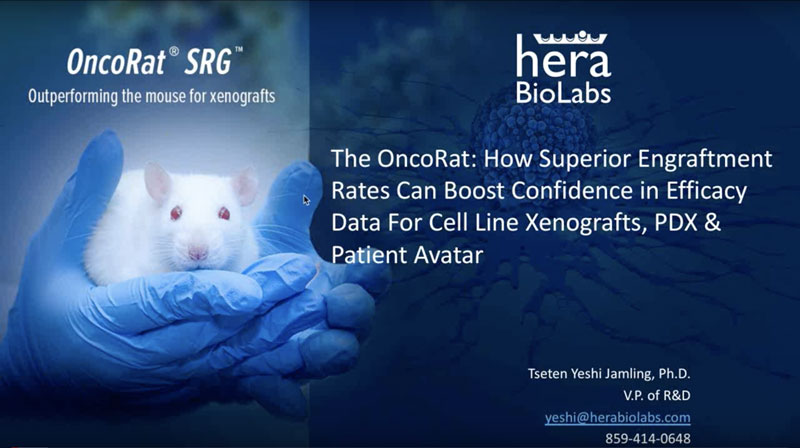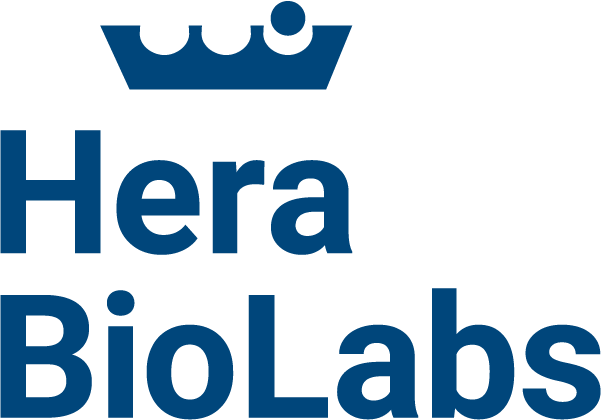A Fully Immunodeficient Rat Model
In this video, experts from Hera Biolabs, the University of Tennessee and the University of Michigan highlight the performance of OncoRat, a fully immunodeficient rat model, in enabling cell line xenografts studies and increasing PDX establishment for difficult samples. The OncoRat demonstrates significant improvement in two key metrics relevant for preclinical oncology studies – engraftment rate and growth kinetics – leading to better success rates and shorter timelines.
Presenters reveal insights from real drug development and personalized patient avatar studies to exemplify how the OncoRat broadens screening opportunities.
During this webinar, discover the benefits of adding OncoRat to your preclinical program, including:
- How the OncoRat delivers superior efficacy data by unlocking the full potential of xenografts
- Faster PDX establishment in fewer passages enables better studies for research & opens the door for patient avatar studies

Fill out the form below to view the video!

Tseten Jamling, PhD.
Vice President of Research and Development, Hera BioLabs
Dr. Jamling is a molecular biologist and expert in genome editing. He was previously Head of R&D at Transposagen Biopharmaceuticals Inc., where he specialized in precision gene-editing With the founding of Hera in 2015, he has led our R&D team, spearheading development and characterization of the OncoRat, and exploring its utility in pre-clinical oncology, toxicology and drug-development studies.
“PDX model establishment in mice is very costly and slow. Data from our NCI contract shows OncoRat cuts the timeline by 3-6 months as we get 10-times more tissue to work with at each passage.”
Ramesh Narayanan, PhD.
Director, Center for Cancer Drug Discovery and Associate Professor, Department of Medicine, University of Tennessee, and Consultant, GTx, Inc.
Dr. Ramesh Narayanan received his Ph.D. from the University of Madras, India. He completed a post-doctoral fellowship at Baylor College of Medicine. He joined GTx, Inc. and served as Senior Scientist and later as the Director of Drug Discovery. In 2014, he joined the University of Tennessee Health Science Center in Memphis as an Associate Professor in the Department of Medicine. He has published 50 peer-reviewed manuscripts, to date, and is an inventor in over 80 patent applications. He is the co-inventor of the Selective Androgen Receptor Degraders (SARDs) technology that has been licensed to GTx, Inc. Dr. Narayanan serves as a consultant to GTx, Inc. and is utilizing the OncoRat in SARD technology and other drug development efforts.
“Unexpectedly, the OncoRat outperformed mouse model take rates, enabling studies in the ideal prostate cancer model, VCaP. This provides new opportunities for us to get more targeted in vivo data and advance our preclinical candidates with accuracy”
Goutham Narla, M.D., PhD.
Chief, Division of Genetic Medicine, University of Michigan
Dr. Narla has held multiple successful academic and industry positions including at Mount Sinai, Case Western Reserve University as well as Founder and CSO of Dual Therapeutics, an oncology drug discovery company. He recently joined the faculty at Michigan Medicine as the Chief of the Division of Genetic Medicine. Dr. Narla is an expert in cancer genetics as well as the xenograft and transgenic models of cancer with over 58 publications in the field. One of his primary interests is connecting improved preclinical modeling to patient outcomes – a goal he anticipates the OncoRat can play a role in.
“The speed and engraftment rate of the OncoRat opens the door to feasible and predictive in vivo patient avatar studies for the first time”


